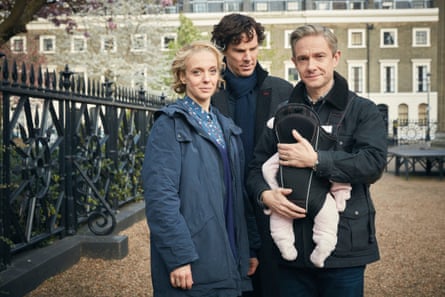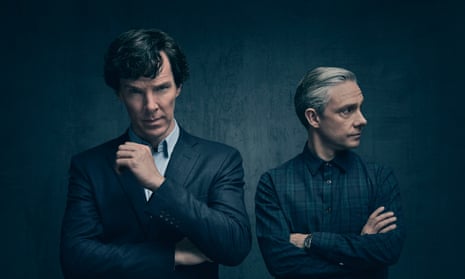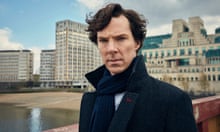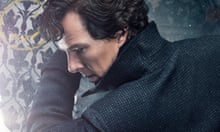Spoiler alert: this review contains spoilers to the Sherlock episode The Six Thatchers, which aired on 1 January 2017.
It may have been discussed in advance for featuring the destruction of one strong Englishwoman – the plot involves the smashing of six statues of Margaret Thatcher – but the New Year’s Day episode of Sherlock will make headlines after transmission for the annihilation of another.
Mary Watson, the wife of Holmes’s sidekick, shockingly became – following Matthew Crawley in Downton Abbey and Nigel Pargetter in The Archers – the latest fictional character sacrificed over the festive period.
Sherlock co-creators Steven Moffat and Mark Gatiss also work on Doctor Who, which was awarded the other prime seasonal slot on the BBC on Christmas Day. But although the franchises have to some extent overlapped, both tending towards tragicomic love stories, viewers knew that as Amanda Abbington lay slain on the floor she would not shimmeringly regenerate into another actor.
The Arthur Conan Doyle story on which Gatiss based his script has busts of Napoleon being smashed by an intruder. Here, the French emperor’s replacement with the former British prime minister has led to some muttering about the BBC’s supposed leftwing bias. But the point, as Sherlock immediately realises, is that the vandal has no political motivation: he’s looking for something hidden inside a head.
In one respect, Gatiss has even depoliticised the original, which is filled with references to immigrants and refugees, “the outcasts of Europe”. A new sub-plot involving the historical decisions of a villainous woman in Whitehall also logically seemed to lead to Thatcher, but the script again opted to give the BBC press office a quiet holiday.

The bulk of the rewrite, though, stayed scrupulously close to the source. In The Adventure of the Six Napoleons, Watson notes Holmes “being more nearly moved by the softer human emotions than I had ever seen him”. And Benedict Cumberbatch, in The Six Thatchers, is duly allowed far beyond his usual constricted emotional range.
In the middle of the last decade, two veteran fantasy brands – Doctor Who and James Bond – simultaneously hit on the idea of casting classical actors (Christopher Eccleston and Daniel Craig) who could play a Time Lord or a spy with the intensity of Hamlet. Continuing the trend, Cumberbatch stalks Baker Street like a Danish prince with a decisive streak. But this time, as if blurring with Craig, he became a sort of 00221B.
The episode felt very Bond overall – Holmes has never done so much running towards or away from explosions. And thanks to the dramatic impact achieved by director Rachel Talalay, the murder of Mary matched the death of M in Skyfall.
Confronted with a dead friend, her widower and their motherless baby, Cumberbatch’s face (mainly required to remain blank) painted a picture of pain and confusion. And with Mary taking a bullet meant for Sherlock, Martin Freeman’s Watson let out an extended, escalating, animalistic moan. It’s unclear how Gatiss specified the sound in the script but, for King Lear, it was written as the hardest line in theatre: “Howl, howl, howl, howl!”
During a Q&A session after a premiere screening on 19 December, Freeman and Abbington discussed the weirdness of a real-life couple acting the tragic end of a relationship. But soon afterwards, it emerged that the context was uncanny: the actors had actually separated shortly before filming.
Moffat and Gatiss told the same press conference that they were unsure if the remaining cast could be united for future series. Ominously, the last episode in this run, which airs on 15 January, is called The Final Problem – the name of the Conan Doyle story in which Holmes dies. Sherlock detectives will deduce a possible significance from this being the only one of the 13 episodes to use an original title without any alteration.
But even if the worst were to happen, fans of this super-intelligent and hyper-entertaining show – which reached new heights of action and emotion in The Six Thatchers – will note that Conan Doyle, after his Final Problem, had to bring the character back by popular demand.









Comments (…)
Sign in or create your Guardian account to join the discussion